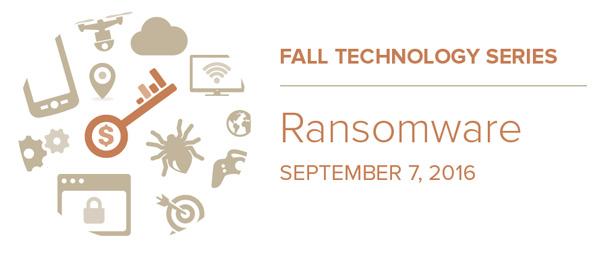Constitution Center
400 7th St SW
Washington
DC
20024
Event Description
With alarming frequency, ransomware hackers are sneaking into consumer and business computers, encrypting files containing photos, documents and other important data, and then demanding a ransom in exchange for the key needed to decrypt the files. At times, these hackers pose as the FBI or other law enforcement officials and claim that the ransom is a “fine” for viewing illegal material and that failure to pay the “fine” will result in criminal prosecution. Consumers, businesses, and government agencies are falling prey to these schemes, including hospitals whose servers may contain sensitive patient data. New forms of ransomware encrypt files of website operators, threatening not only their files containing stored data, but the very files needed to operate their websites. Other variants of ransomware are now targeting files on mobile devices. The Ransomware workshop will address questions such as:
- How do ransomware extortionists gain access to consumer and business computers?
- What role can consumer and business education play in preventing ransomware infections?
- Are there steps consumers and businesses should be taking to reduce the risk of ransomware or to decrease its impact?
- Are there technological measures that computer operating system and web browser designers can take to prevent ransomware?
- Are there browser plug-ins or other tools that consumers and businesses can employ that will warn if their data is about to be encrypted?
- What can be learned from criminal law enforcement’s efforts to combat ransomware?
- If you fall prey to ransomware, should you pay the ransom?
- If you pay the ransom, how likely are you to receive the decryption key and be able to view your files?
- What happens if you don’t pay the ransom? Are your files lost forever?
Staff Contact
Dan Salsburg
(202) 326-3402
-
12:00 pm
Registration
1:00 pm
Introductory Remarks
Ben Rossen
Staff Attorney, Division of Privacy & Identity Protection, FTC
Opening Remarks
Edith Ramirez
Chairwoman, Federal Trade Commission1:15 pm Panel 1: Overview of the Ransomware Threat
Moderator:
Steve Wernikoff
Office of Technology Research & Investigation, FTCPanelists:
Craig Williams
Sr. Technical Leader, Global Outreach Manager, Cisco TalosJoseph Opacki
Vice President of Threat Research, PhishLabsLance James
Chief Scientist, FlashpointGeorgia Weidman
Founder and CTO, Shevirah Inc.2:10 pm
Presentation by Office of Technology Research & Investigation
Joe Calandrino
Office of Technology Research & Investigation, FTC
Anthony Masi
New York University2:40 pm Break 3:00pm
Panel 2: Best Defense Tactics Against Ransomware
Moderator:
Ben Rossen
Division of Privacy & Identity Protection, FTCPanelists:
Lorrie Cranor
Chief Technologist, FTCBill Wright
Director of Government Affairs, SymantecKeith McCammon
Chief Security Officer/Co-Founder, Red CanaryJim Walter
Senior Researcher, Cylance SPEAR TeamChad Wilson
Director of Information Security, Children’s National Medical Center3:45 pm
Panel 3: What Happens If You Become a Victim?
Moderator:
Will Maxson
Assistant Director, Division of Marketing Practices, FTCPanelists:
Will Bales
Supervisory Special Agent, Cyber Division, Federal Bureau of InvestigationSerge Jorgensen
President, The Sylint GroupAdam Malone
Director, Cyber Investigations and Breach Response, PwCBill Hardin
Vice President, Charles River Associates
Päivi Tynninen
Researcher, F-Secure
- FileSpeaker Bios (169.77 KB)
-
Location


Request for Comments
Public comments will be accepted until Friday, October 7, 2016. Comments can be submitted online.